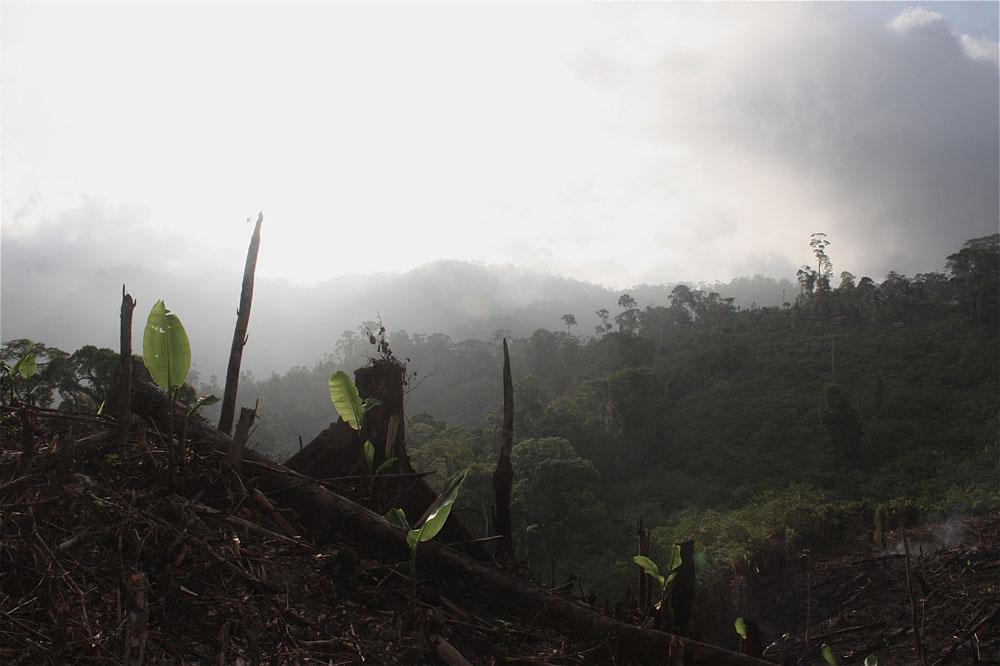A new opinion piece in the National Philippine Inquirer
COMMENTARY
Palawan’s indigenous food, forests threatened
By: Marvin Montefrio, Wolfram Dressler - @inquirerdotnet Philippine Daily Inquirer / 05:20 AM May 10, 2018
Rapidly expanding oil palm plantations threaten indigenous lands and food security in Palawan, the Philippines’ last ecological frontier.
At last count, at least 9,000 hectares of land have been cleared, claimed and planted to oil palm in southern Palawan, the justification being that the oil from the plantations and labor opportunities offer “inclusive,” “sustainable” and “green” development opportunities. Research by the Coalition Against Land Grabbing and its NGO partners point to major renewed interest in ramping up the financial and capital investments in oil palm expansion in both Palawan and Mindanao (https://www.rainforest-rescue.org/petitions/1089/we-need-our-land-not-oil-palms).
Paralleling the forest plunder in Indonesia and Malaysia, oil palm expansion in Palawan is unfolding at an alarming rate and with devastating consequences: Oil palm is destroying Palawan’s forests, encroaching on ancestral domains and, increasingly, threatening the indigenous peoples’ food security.
In a forthcoming paper in the international journal Development and Change, we show that the customary food security of the indigenous Pala’wan is being threatened by interrelated dynamics:
As oil palm expands into lower sections of upland areas, plantations claim and destroy indigenous swidden farms (uma) that feed families. As oil palm moves further upland, it destroys older swidden fallows and storehouses of agroecological (including knowledge and genetic) diversity that’s drawn on throughout the year, particularly in times of hunger. When cooperatives hire indigenous Pala’wan as laborers on the plantations, their customary food supply is gradually substituted with commercial goods and provisions (on credit) to ensure their continued work there. The case of the cooperatives is particularly alarming. While cooperatives once held a redistributive function, offering credit and supplies to help poor farmers overcome establishment and production costs, they now broker oil palm expansion by drawing in indigenous peoples (as members and nonmembers) to labor during the various phases of plantation preparation. Cooperatives use the bale system to provide indigenous laborers, often women with children, provisions (rice, salt, MSG seasoning, sugar, coffee, sardines, corned beef, instant noodles, etc.), to ensure they can work longer in plantations in often hot, arduous conditions. As indigenous oil palm laborers have less time to work their own swidden fields, produce their own crops, and tend to their families, they are further compelled to draw on credit foods to feed their families as they are pulled deeper into the patron-client relations of the plantation economy.
Oil-palm-driven land grabs, swidden destruction and dependency on cooperatives are devastating for the indigenous poor and upland forest landscapes. The same indigenous workers who lose their main land areas become indebted to the cooperatives and dependent on high-sodium foods of low nutritional value that ultimately erode their ability to access and use customary foods. Indigenous peoples thus lose control over their abilities and rights to produce diverse, culturally appropriate, nutritious foods from field and forest.
When oil palm estates convert forests to mono-cultured plantations, the socioecological diversity of indigenous forest spaces is also lost. The end result is an increase in food insecurity due to incremental cultural and ecological impoverishment. Neglected are incredible diversities of upland rice, root crops (cassava, sweet potato and purple yam), fruit-bearing tree crops (banana, mango, calamansi, jackfruit), and high-protein forest game and foods (wild boar, honey and bee larvae). These resources ensure the indigenous Pala’wan food security across generations (https://www.researchgate.net/publication/321770405_Ungovernable_The_vital_natures_of_swidden_assemblages_in_an_upland_frontier).
With oil palm encroachment, they may be gone forever, and with them, the forest biodiversity that allows indigenous peoples in Palawan and Mindanao to live with dignity, self-sufficiency and autonomy. They have done this for centuries. Why must it end with thorny, inedible oil palm?
We thank the Pala’wan of southern Palawan who have given their free, prior and informed consent for our research. Our work is for you.
*Associate Professor Wolfram Dressler is with the School of Geography, University of Melbourne; Assistant Professor Marvin Montefrio is with the Environmental Studies Programme, Yale-NUS College, Singapore.
Read more: https://opinion.inquirer.net/113068/palawans-indigenous-food-forests-threatened#ixzz5qRg14m1B






